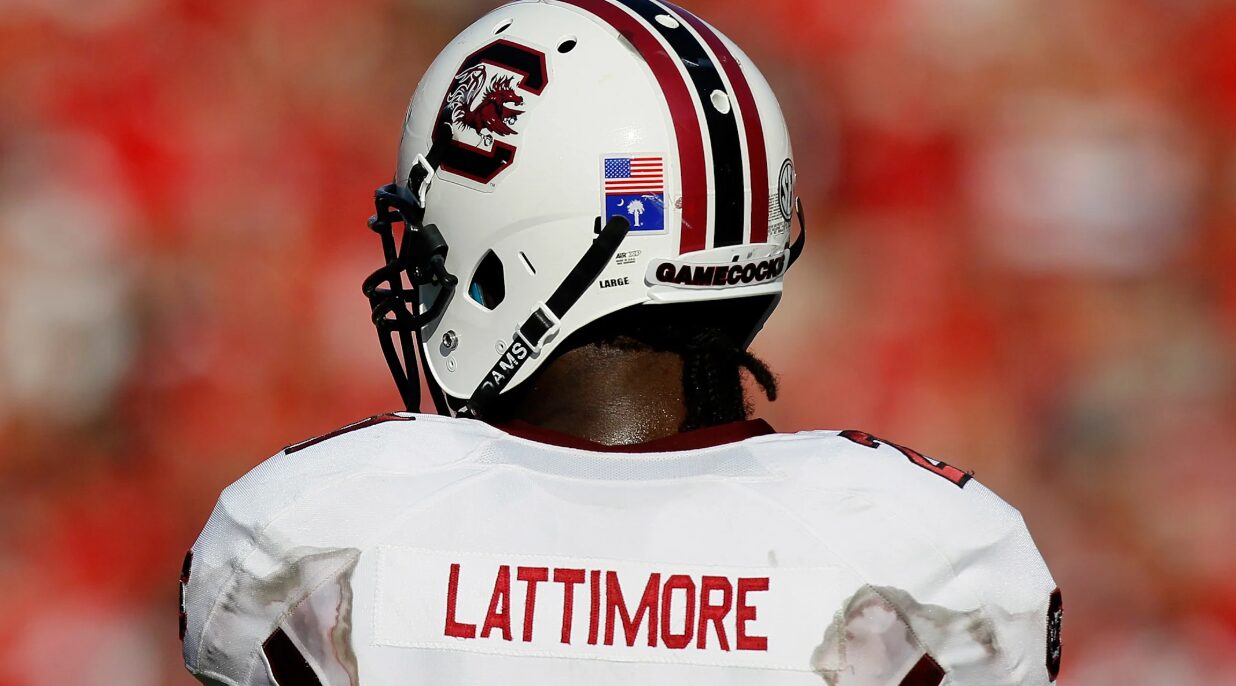Headline: Marcus Lattimore Opens Up About His South Carolina Football Journey and Life After Injuries
In a candid interview with Johnny Manziel on the “Glory Daze” podcast, Marcus Lattimore reflects on his impactful career with South Carolina football, the challenges of career-altering injuries, and his path to finding purpose beyond the game
On October 27, 2012, during a game against the Tennessee Volunteers, South Carolina’s star running back, Marcus Lattimore, endured a tragic knee injury that left a lasting impression on college football fans across the country. The image of Lattimore lying on the field with his leg severely injured is a moment many remember with deep sorrow.
I can clearly recall that day. Sitting next to my then-husband on the couch, we were fully absorbed in the South Carolina vs. Tennessee game. The play unfolded: the snap, Lattimore’s determined run, the collision with defenders, and then… his leg unnaturally suspended in the air. I screamed in horror as my husband leapt up, his hands covering his mouth in disbelief. Then, an eerie silence.
In the moments following, a quiet fell over Williams-Brice Stadium. Players from both teams knelt in unity, and fans stood frozen, absorbing the seriousness of the injury. The emotional weight of the moment was heavy, as tears flowed from teammates, opponents, and spectators alike.
For many, the memory of where they were when Lattimore was injured remains vivid. It’s a poignant reminder of the vulnerability inherent in the sport and the strong bonds between athletes and their supporters. Lattimore’s strength and dignity in the face of hardship continue to inspire, highlighting the profound influence he has had on the South Carolina community and beyond.
In a recent episode of the “Glory Daze” podcast, former NFL quarterback Johnny Manziel had a candid conversation with the South Carolina football legend. They discussed Lattimore’s career, the hurdles he faced due to injuries, and his life after football.
Commitment to South Carolina:
Lattimore talked about his choice to commit to the University of South Carolina, noting the significant role played by then-head coach Steve Spurrier and the welcoming community that made him feel like he truly belonged. He expressed the pride and sense of duty he felt in representing his home state on the national stage.
As one of the most highly recruited players in South Carolina’s history, Lattimore made an immediate impact when he joined the Gamecocks. His standout performance in his freshman year earned him national recognition and confirmed his role as a key player. His commitment and skill were crucial in raising the team’s profile during his time at South Carolina.
Memorable Moments:
Looking back on his time with the Gamecocks, Lattimore recalled key games and accomplishments, such as:
Historic Win: He reminisced about South Carolina’s groundbreaking victory over the No. 1 ranked Alabama in 2010, where he played a crucial role.
Personal Achievements: Lattimore discussed setting the school record for touchdowns and the strong bond he shared with his teammates, which played a significant part in their success.
Career-Altering Injuries:
Lattimore reflected on the severe knee injuries he sustained while at the University of South Carolina, which dramatically altered his promising football career. He openly discussed the physical and emotional challenges these injuries caused, along with the grueling rehabilitation process he faced in an effort to make a comeback on the field.
Transitioning Beyond Football:
The discussion explored Lattimore’s life after football, focusing on his efforts to reshape his identity and purpose beyond athletics. He shared his experiences in mentoring young athletes, stressing the significance of mental health and resilience. Lattimore also talked about his initiatives to help athletes prepare for life after sports, ensuring they are equipped with the resources and support needed to transition into post-athletic careers.
Shared Experiences with Manziel:
Both Lattimore and Manziel reflected on the pressures and expectations of being high-profile college athletes. They talked about the challenges of handling public scrutiny, the effects of injuries on their careers, and the mental health struggles that often accompany such experiences. Their conversation offered a deeper understanding of the ups and downs of collegiate athletics and the importance of having a strong support system.
Legacy and Influence:
Lattimore’s impact extended beyond his athletic accomplishments, with his character and humility leaving a lasting impression. His decision to stay close to home for college and his active engagement with fans and the community showcased his genuine nature. Even after his playing career, his involvement in mentoring and supporting young athletes demonstrated his commitment to giving back. In the interview, Lattimore spoke about his role in mentoring programs and his efforts to help young players cope with the pressures of college sports.
Ultimately, Marcus Lattimore’s legacy at South Carolina goes beyond his athletic feats. His combination of talent, resilience, and integrity has left a lasting imprint, making him one of the most admired figures in the university’s history.
This conversation between two football legends offers valuable insights into the resilience and adaptability athletes need to face unexpected challenges, while also underscoring the importance of mental health awareness in sports.



No Comment! Be the first one.